Student Discipline or Professional Behaviour Management Analysis
VerifiedAdded on 2022/08/24
|15
|4314
|18
Essay
AI Summary
This essay provides a comprehensive analysis of student discipline and professional behaviour management within nursing education. It emphasizes the importance of leadership competences, clinical skills, and effective communication in shaping nursing students' development. The essay explores various aspects, including the role of educators, the impact of transformational leadership, and the integration of eLearning. It highlights the significance of NMBI standards, ethical considerations, and the development of positive attitudes among students. The essay also discusses the importance of discipline for time management, patient care prioritization, and the development of essential skills. Furthermore, it examines the influence of regulations, innovative teaching methods, and motivational approaches on student behaviour. The essay concludes by emphasizing the need for educators to possess effective leadership and management skills to foster a positive learning environment and address challenges related to student behaviour and discipline, ultimately aiming to improve patient care and align with NMBI standards.
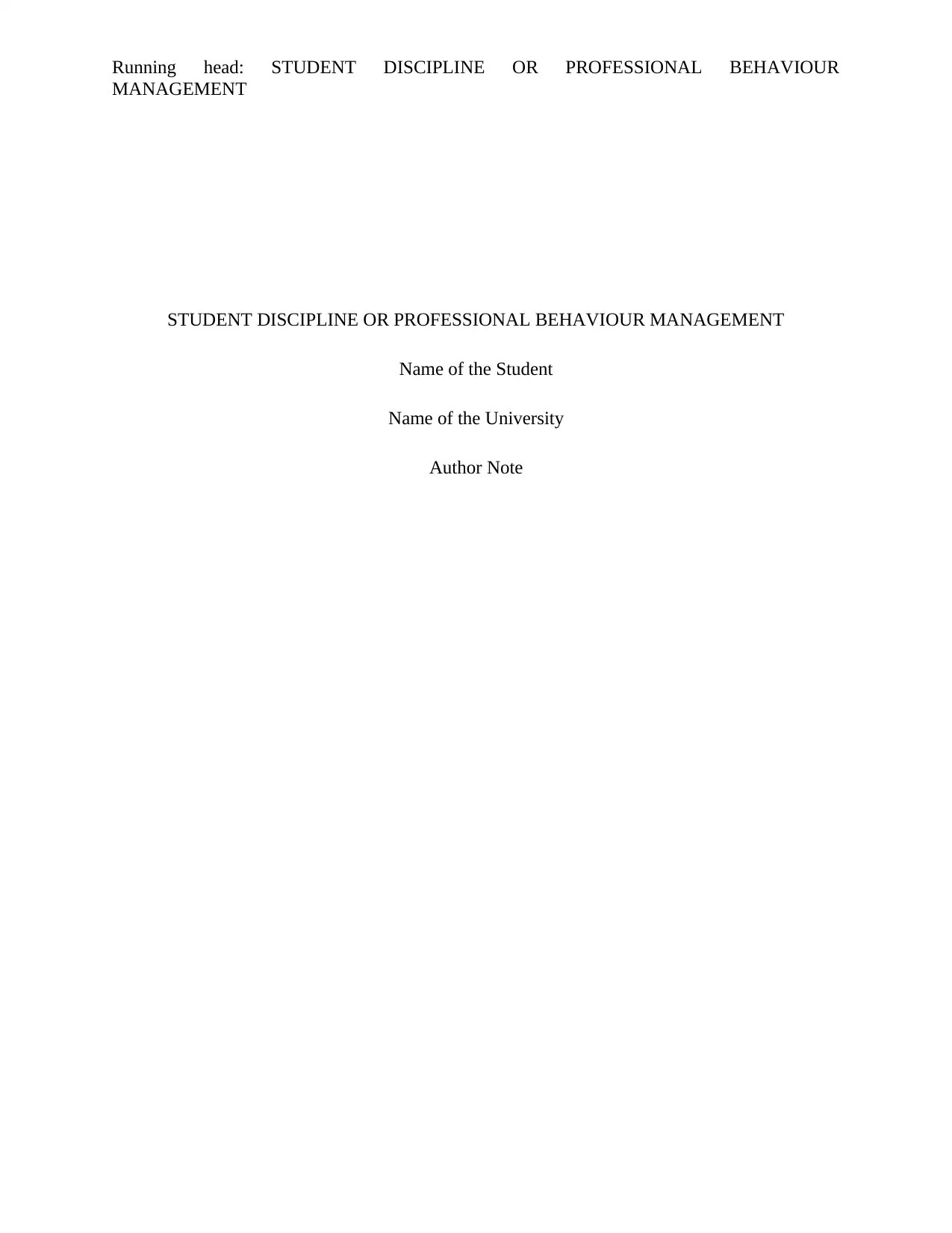
Running head: STUDENT DISCIPLINE OR PROFESSIONAL BEHAVIOUR
MANAGEMENT
STUDENT DISCIPLINE OR PROFESSIONAL BEHAVIOUR MANAGEMENT
Name of the Student
Name of the University
Author Note
MANAGEMENT
STUDENT DISCIPLINE OR PROFESSIONAL BEHAVIOUR MANAGEMENT
Name of the Student
Name of the University
Author Note
Paraphrase This Document
Need a fresh take? Get an instant paraphrase of this document with our AI Paraphraser
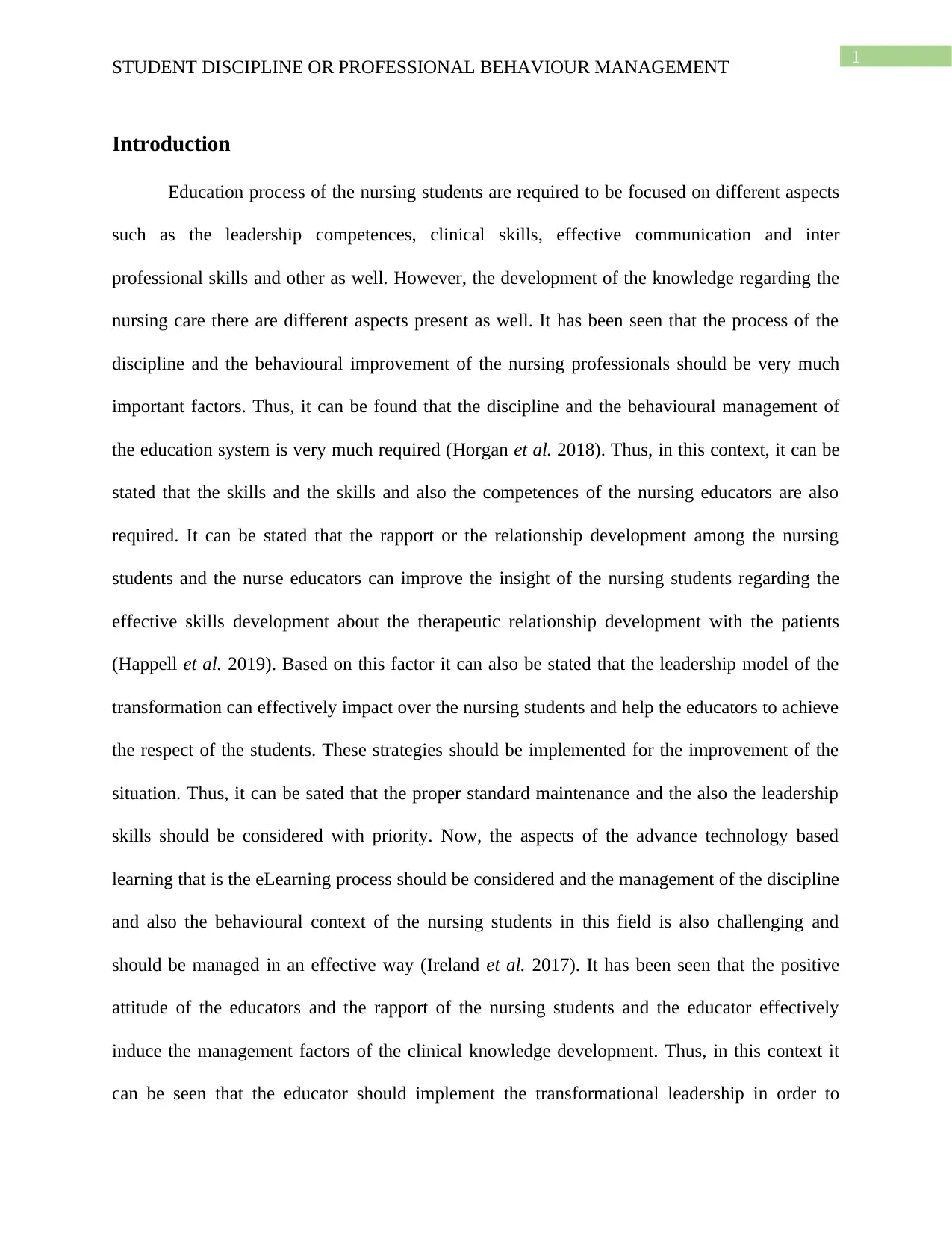
1
STUDENT DISCIPLINE OR PROFESSIONAL BEHAVIOUR MANAGEMENT
Introduction
Education process of the nursing students are required to be focused on different aspects
such as the leadership competences, clinical skills, effective communication and inter
professional skills and other as well. However, the development of the knowledge regarding the
nursing care there are different aspects present as well. It has been seen that the process of the
discipline and the behavioural improvement of the nursing professionals should be very much
important factors. Thus, it can be found that the discipline and the behavioural management of
the education system is very much required (Horgan et al. 2018). Thus, in this context, it can be
stated that the skills and the skills and also the competences of the nursing educators are also
required. It can be stated that the rapport or the relationship development among the nursing
students and the nurse educators can improve the insight of the nursing students regarding the
effective skills development about the therapeutic relationship development with the patients
(Happell et al. 2019). Based on this factor it can also be stated that the leadership model of the
transformation can effectively impact over the nursing students and help the educators to achieve
the respect of the students. These strategies should be implemented for the improvement of the
situation. Thus, it can be sated that the proper standard maintenance and the also the leadership
skills should be considered with priority. Now, the aspects of the advance technology based
learning that is the eLearning process should be considered and the management of the discipline
and also the behavioural context of the nursing students in this field is also challenging and
should be managed in an effective way (Ireland et al. 2017). It has been seen that the positive
attitude of the educators and the rapport of the nursing students and the educator effectively
induce the management factors of the clinical knowledge development. Thus, in this context it
can be seen that the educator should implement the transformational leadership in order to
STUDENT DISCIPLINE OR PROFESSIONAL BEHAVIOUR MANAGEMENT
Introduction
Education process of the nursing students are required to be focused on different aspects
such as the leadership competences, clinical skills, effective communication and inter
professional skills and other as well. However, the development of the knowledge regarding the
nursing care there are different aspects present as well. It has been seen that the process of the
discipline and the behavioural improvement of the nursing professionals should be very much
important factors. Thus, it can be found that the discipline and the behavioural management of
the education system is very much required (Horgan et al. 2018). Thus, in this context, it can be
stated that the skills and the skills and also the competences of the nursing educators are also
required. It can be stated that the rapport or the relationship development among the nursing
students and the nurse educators can improve the insight of the nursing students regarding the
effective skills development about the therapeutic relationship development with the patients
(Happell et al. 2019). Based on this factor it can also be stated that the leadership model of the
transformation can effectively impact over the nursing students and help the educators to achieve
the respect of the students. These strategies should be implemented for the improvement of the
situation. Thus, it can be sated that the proper standard maintenance and the also the leadership
skills should be considered with priority. Now, the aspects of the advance technology based
learning that is the eLearning process should be considered and the management of the discipline
and also the behavioural context of the nursing students in this field is also challenging and
should be managed in an effective way (Ireland et al. 2017). It has been seen that the positive
attitude of the educators and the rapport of the nursing students and the educator effectively
induce the management factors of the clinical knowledge development. Thus, in this context it
can be seen that the educator should implement the transformational leadership in order to
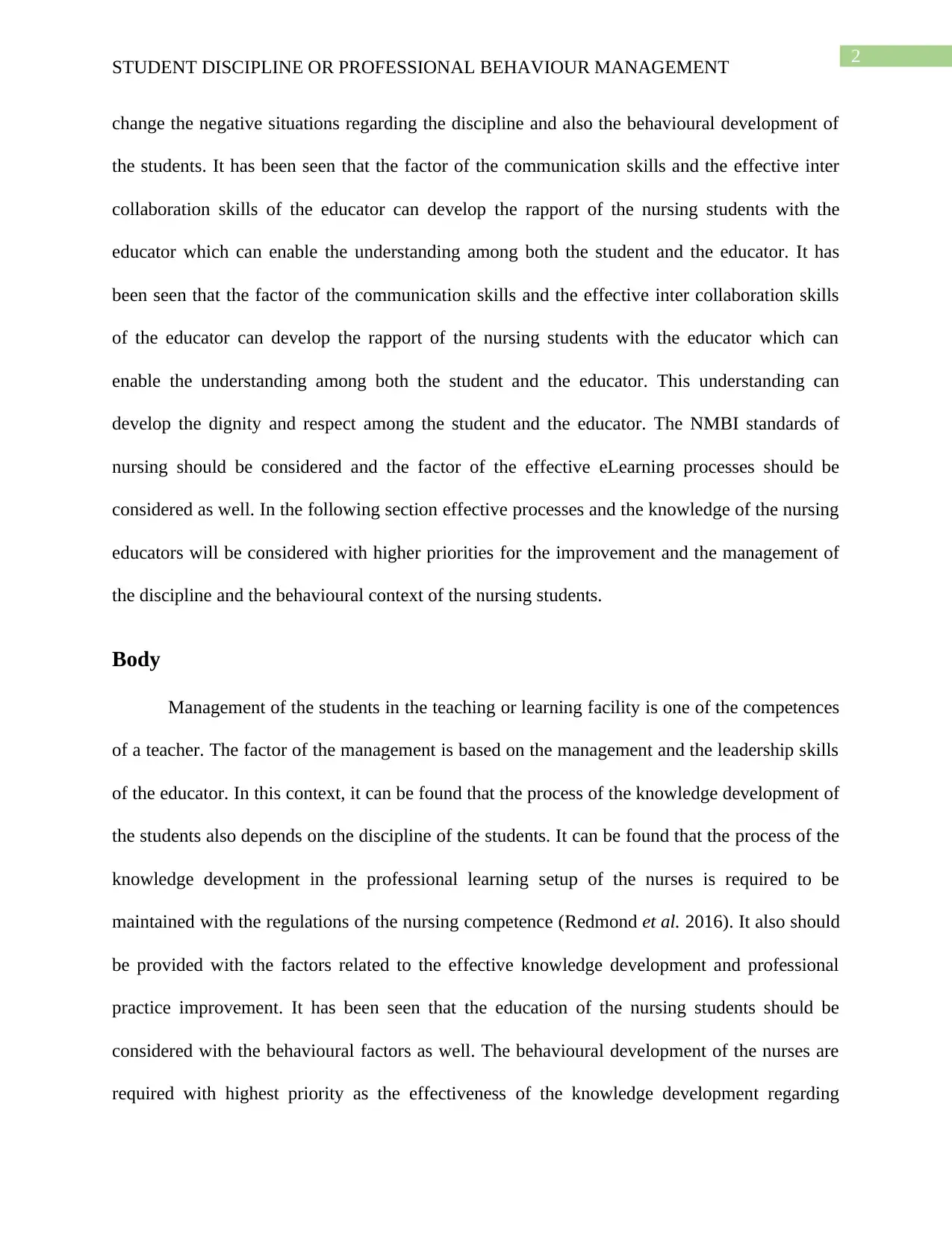
2
STUDENT DISCIPLINE OR PROFESSIONAL BEHAVIOUR MANAGEMENT
change the negative situations regarding the discipline and also the behavioural development of
the students. It has been seen that the factor of the communication skills and the effective inter
collaboration skills of the educator can develop the rapport of the nursing students with the
educator which can enable the understanding among both the student and the educator. It has
been seen that the factor of the communication skills and the effective inter collaboration skills
of the educator can develop the rapport of the nursing students with the educator which can
enable the understanding among both the student and the educator. This understanding can
develop the dignity and respect among the student and the educator. The NMBI standards of
nursing should be considered and the factor of the effective eLearning processes should be
considered as well. In the following section effective processes and the knowledge of the nursing
educators will be considered with higher priorities for the improvement and the management of
the discipline and the behavioural context of the nursing students.
Body
Management of the students in the teaching or learning facility is one of the competences
of a teacher. The factor of the management is based on the management and the leadership skills
of the educator. In this context, it can be found that the process of the knowledge development of
the students also depends on the discipline of the students. It can be found that the process of the
knowledge development in the professional learning setup of the nurses is required to be
maintained with the regulations of the nursing competence (Redmond et al. 2016). It also should
be provided with the factors related to the effective knowledge development and professional
practice improvement. It has been seen that the education of the nursing students should be
considered with the behavioural factors as well. The behavioural development of the nurses are
required with highest priority as the effectiveness of the knowledge development regarding
STUDENT DISCIPLINE OR PROFESSIONAL BEHAVIOUR MANAGEMENT
change the negative situations regarding the discipline and also the behavioural development of
the students. It has been seen that the factor of the communication skills and the effective inter
collaboration skills of the educator can develop the rapport of the nursing students with the
educator which can enable the understanding among both the student and the educator. It has
been seen that the factor of the communication skills and the effective inter collaboration skills
of the educator can develop the rapport of the nursing students with the educator which can
enable the understanding among both the student and the educator. This understanding can
develop the dignity and respect among the student and the educator. The NMBI standards of
nursing should be considered and the factor of the effective eLearning processes should be
considered as well. In the following section effective processes and the knowledge of the nursing
educators will be considered with higher priorities for the improvement and the management of
the discipline and the behavioural context of the nursing students.
Body
Management of the students in the teaching or learning facility is one of the competences
of a teacher. The factor of the management is based on the management and the leadership skills
of the educator. In this context, it can be found that the process of the knowledge development of
the students also depends on the discipline of the students. It can be found that the process of the
knowledge development in the professional learning setup of the nurses is required to be
maintained with the regulations of the nursing competence (Redmond et al. 2016). It also should
be provided with the factors related to the effective knowledge development and professional
practice improvement. It has been seen that the education of the nursing students should be
considered with the behavioural factors as well. The behavioural development of the nurses are
required with highest priority as the effectiveness of the knowledge development regarding
⊘ This is a preview!⊘
Do you want full access?
Subscribe today to unlock all pages.

Trusted by 1+ million students worldwide
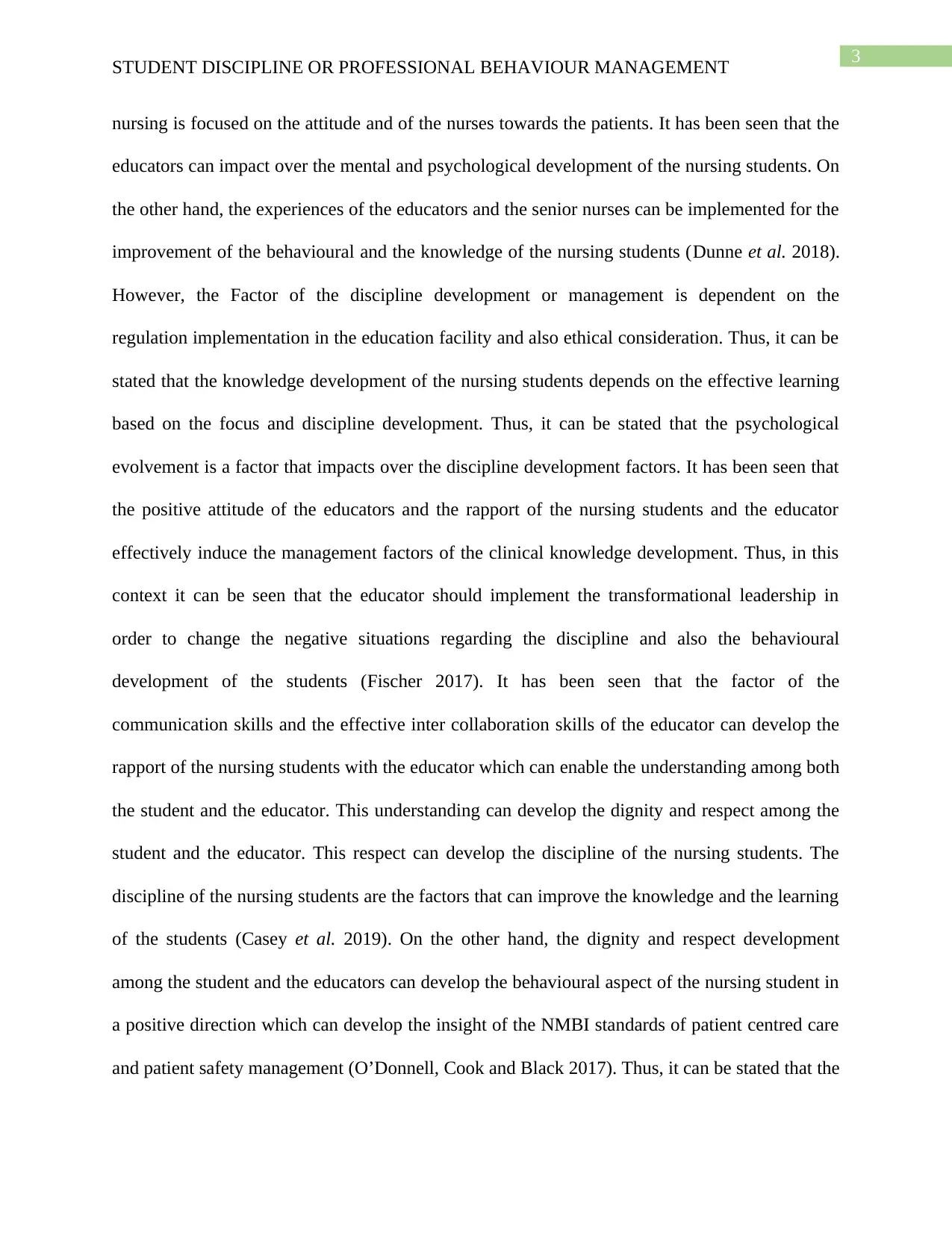
3
STUDENT DISCIPLINE OR PROFESSIONAL BEHAVIOUR MANAGEMENT
nursing is focused on the attitude and of the nurses towards the patients. It has been seen that the
educators can impact over the mental and psychological development of the nursing students. On
the other hand, the experiences of the educators and the senior nurses can be implemented for the
improvement of the behavioural and the knowledge of the nursing students (Dunne et al. 2018).
However, the Factor of the discipline development or management is dependent on the
regulation implementation in the education facility and also ethical consideration. Thus, it can be
stated that the knowledge development of the nursing students depends on the effective learning
based on the focus and discipline development. Thus, it can be stated that the psychological
evolvement is a factor that impacts over the discipline development factors. It has been seen that
the positive attitude of the educators and the rapport of the nursing students and the educator
effectively induce the management factors of the clinical knowledge development. Thus, in this
context it can be seen that the educator should implement the transformational leadership in
order to change the negative situations regarding the discipline and also the behavioural
development of the students (Fischer 2017). It has been seen that the factor of the
communication skills and the effective inter collaboration skills of the educator can develop the
rapport of the nursing students with the educator which can enable the understanding among both
the student and the educator. This understanding can develop the dignity and respect among the
student and the educator. This respect can develop the discipline of the nursing students. The
discipline of the nursing students are the factors that can improve the knowledge and the learning
of the students (Casey et al. 2019). On the other hand, the dignity and respect development
among the student and the educators can develop the behavioural aspect of the nursing student in
a positive direction which can develop the insight of the NMBI standards of patient centred care
and patient safety management (O’Donnell, Cook and Black 2017). Thus, it can be stated that the
STUDENT DISCIPLINE OR PROFESSIONAL BEHAVIOUR MANAGEMENT
nursing is focused on the attitude and of the nurses towards the patients. It has been seen that the
educators can impact over the mental and psychological development of the nursing students. On
the other hand, the experiences of the educators and the senior nurses can be implemented for the
improvement of the behavioural and the knowledge of the nursing students (Dunne et al. 2018).
However, the Factor of the discipline development or management is dependent on the
regulation implementation in the education facility and also ethical consideration. Thus, it can be
stated that the knowledge development of the nursing students depends on the effective learning
based on the focus and discipline development. Thus, it can be stated that the psychological
evolvement is a factor that impacts over the discipline development factors. It has been seen that
the positive attitude of the educators and the rapport of the nursing students and the educator
effectively induce the management factors of the clinical knowledge development. Thus, in this
context it can be seen that the educator should implement the transformational leadership in
order to change the negative situations regarding the discipline and also the behavioural
development of the students (Fischer 2017). It has been seen that the factor of the
communication skills and the effective inter collaboration skills of the educator can develop the
rapport of the nursing students with the educator which can enable the understanding among both
the student and the educator. This understanding can develop the dignity and respect among the
student and the educator. This respect can develop the discipline of the nursing students. The
discipline of the nursing students are the factors that can improve the knowledge and the learning
of the students (Casey et al. 2019). On the other hand, the dignity and respect development
among the student and the educators can develop the behavioural aspect of the nursing student in
a positive direction which can develop the insight of the NMBI standards of patient centred care
and patient safety management (O’Donnell, Cook and Black 2017). Thus, it can be stated that the
Paraphrase This Document
Need a fresh take? Get an instant paraphrase of this document with our AI Paraphraser
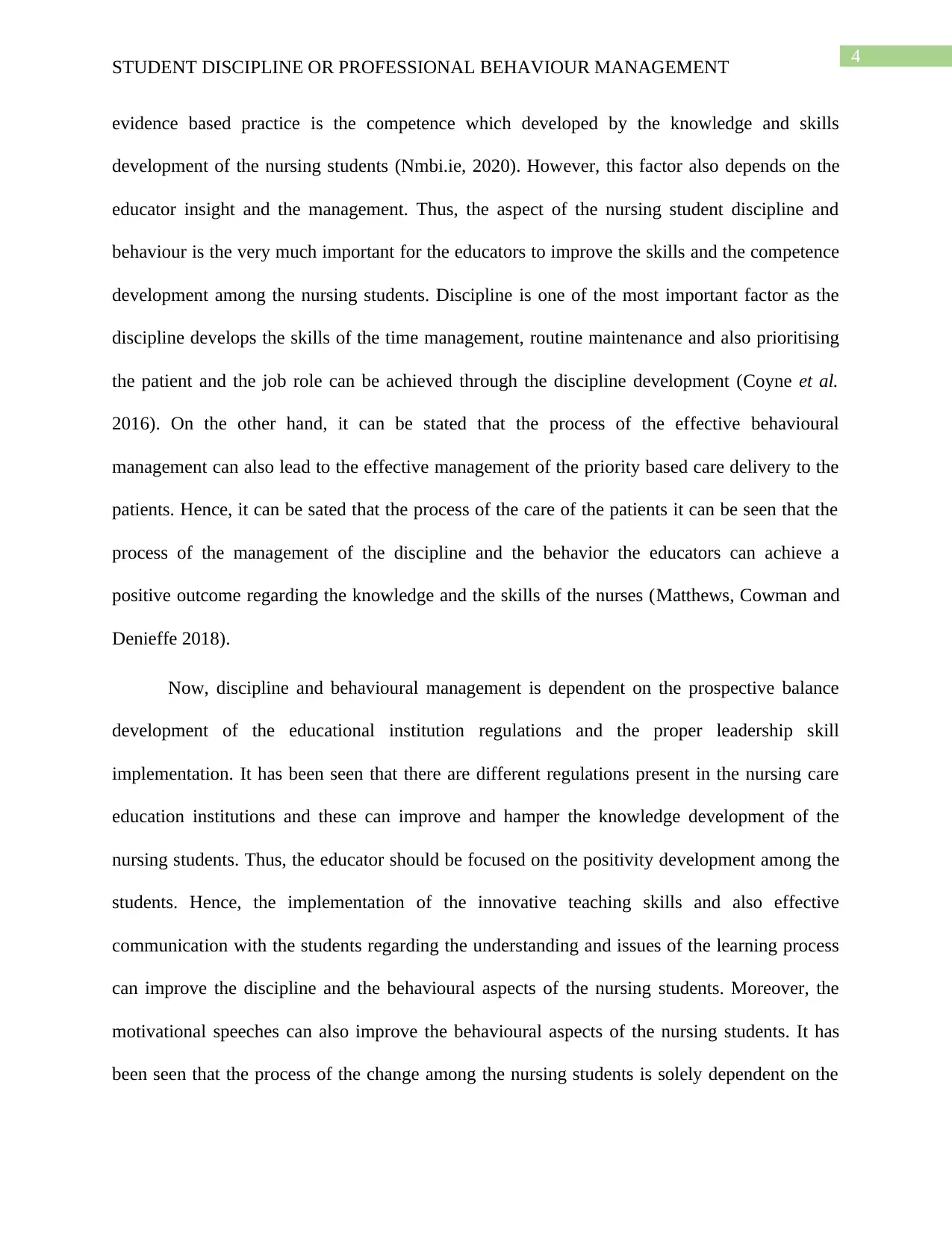
4
STUDENT DISCIPLINE OR PROFESSIONAL BEHAVIOUR MANAGEMENT
evidence based practice is the competence which developed by the knowledge and skills
development of the nursing students (Nmbi.ie, 2020). However, this factor also depends on the
educator insight and the management. Thus, the aspect of the nursing student discipline and
behaviour is the very much important for the educators to improve the skills and the competence
development among the nursing students. Discipline is one of the most important factor as the
discipline develops the skills of the time management, routine maintenance and also prioritising
the patient and the job role can be achieved through the discipline development (Coyne et al.
2016). On the other hand, it can be stated that the process of the effective behavioural
management can also lead to the effective management of the priority based care delivery to the
patients. Hence, it can be sated that the process of the care of the patients it can be seen that the
process of the management of the discipline and the behavior the educators can achieve a
positive outcome regarding the knowledge and the skills of the nurses (Matthews, Cowman and
Denieffe 2018).
Now, discipline and behavioural management is dependent on the prospective balance
development of the educational institution regulations and the proper leadership skill
implementation. It has been seen that there are different regulations present in the nursing care
education institutions and these can improve and hamper the knowledge development of the
nursing students. Thus, the educator should be focused on the positivity development among the
students. Hence, the implementation of the innovative teaching skills and also effective
communication with the students regarding the understanding and issues of the learning process
can improve the discipline and the behavioural aspects of the nursing students. Moreover, the
motivational speeches can also improve the behavioural aspects of the nursing students. It has
been seen that the process of the change among the nursing students is solely dependent on the
STUDENT DISCIPLINE OR PROFESSIONAL BEHAVIOUR MANAGEMENT
evidence based practice is the competence which developed by the knowledge and skills
development of the nursing students (Nmbi.ie, 2020). However, this factor also depends on the
educator insight and the management. Thus, the aspect of the nursing student discipline and
behaviour is the very much important for the educators to improve the skills and the competence
development among the nursing students. Discipline is one of the most important factor as the
discipline develops the skills of the time management, routine maintenance and also prioritising
the patient and the job role can be achieved through the discipline development (Coyne et al.
2016). On the other hand, it can be stated that the process of the effective behavioural
management can also lead to the effective management of the priority based care delivery to the
patients. Hence, it can be sated that the process of the care of the patients it can be seen that the
process of the management of the discipline and the behavior the educators can achieve a
positive outcome regarding the knowledge and the skills of the nurses (Matthews, Cowman and
Denieffe 2018).
Now, discipline and behavioural management is dependent on the prospective balance
development of the educational institution regulations and the proper leadership skill
implementation. It has been seen that there are different regulations present in the nursing care
education institutions and these can improve and hamper the knowledge development of the
nursing students. Thus, the educator should be focused on the positivity development among the
students. Hence, the implementation of the innovative teaching skills and also effective
communication with the students regarding the understanding and issues of the learning process
can improve the discipline and the behavioural aspects of the nursing students. Moreover, the
motivational speeches can also improve the behavioural aspects of the nursing students. It has
been seen that the process of the change among the nursing students is solely dependent on the
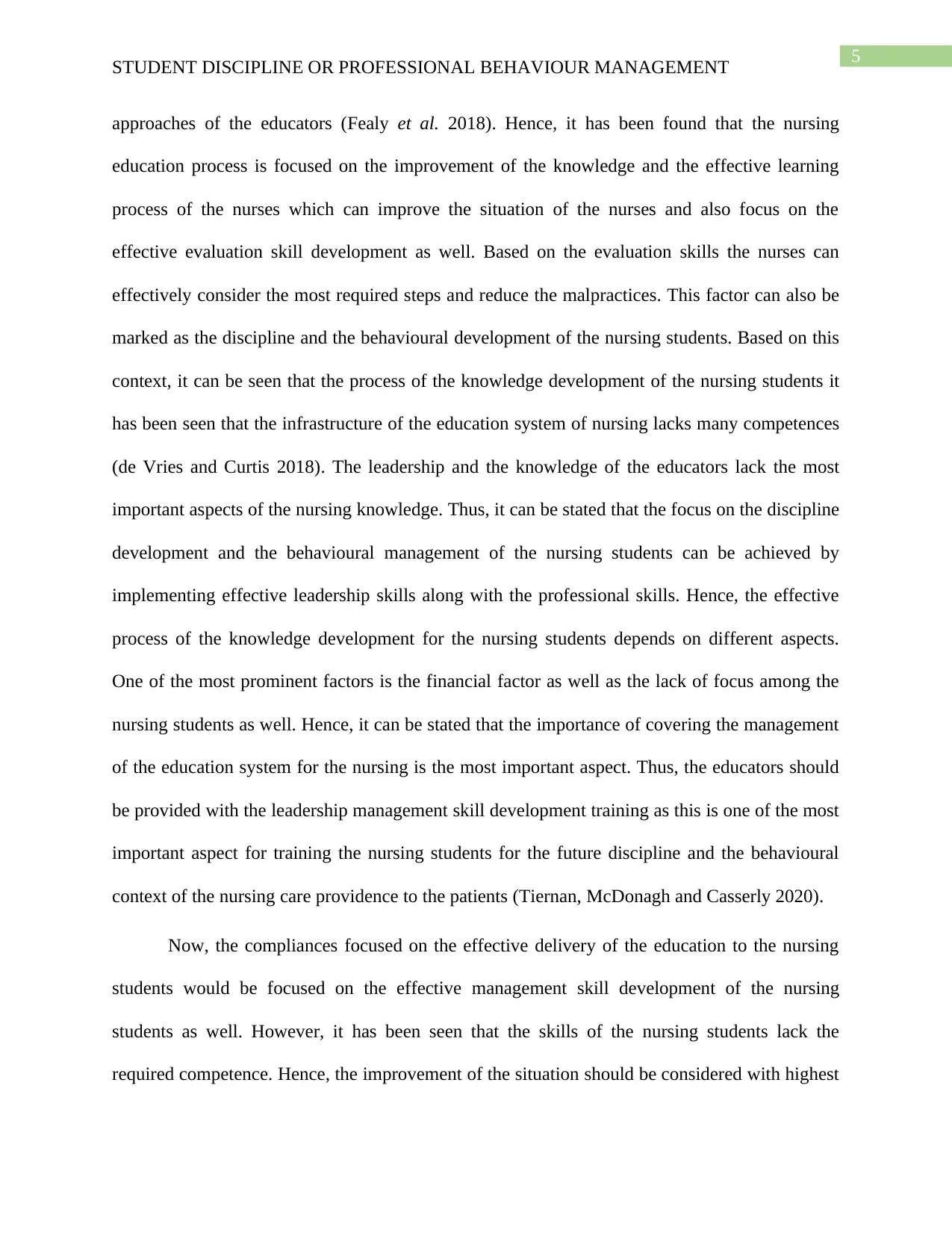
5
STUDENT DISCIPLINE OR PROFESSIONAL BEHAVIOUR MANAGEMENT
approaches of the educators (Fealy et al. 2018). Hence, it has been found that the nursing
education process is focused on the improvement of the knowledge and the effective learning
process of the nurses which can improve the situation of the nurses and also focus on the
effective evaluation skill development as well. Based on the evaluation skills the nurses can
effectively consider the most required steps and reduce the malpractices. This factor can also be
marked as the discipline and the behavioural development of the nursing students. Based on this
context, it can be seen that the process of the knowledge development of the nursing students it
has been seen that the infrastructure of the education system of nursing lacks many competences
(de Vries and Curtis 2018). The leadership and the knowledge of the educators lack the most
important aspects of the nursing knowledge. Thus, it can be stated that the focus on the discipline
development and the behavioural management of the nursing students can be achieved by
implementing effective leadership skills along with the professional skills. Hence, the effective
process of the knowledge development for the nursing students depends on different aspects.
One of the most prominent factors is the financial factor as well as the lack of focus among the
nursing students as well. Hence, it can be stated that the importance of covering the management
of the education system for the nursing is the most important aspect. Thus, the educators should
be provided with the leadership management skill development training as this is one of the most
important aspect for training the nursing students for the future discipline and the behavioural
context of the nursing care providence to the patients (Tiernan, McDonagh and Casserly 2020).
Now, the compliances focused on the effective delivery of the education to the nursing
students would be focused on the effective management skill development of the nursing
students as well. However, it has been seen that the skills of the nursing students lack the
required competence. Hence, the improvement of the situation should be considered with highest
STUDENT DISCIPLINE OR PROFESSIONAL BEHAVIOUR MANAGEMENT
approaches of the educators (Fealy et al. 2018). Hence, it has been found that the nursing
education process is focused on the improvement of the knowledge and the effective learning
process of the nurses which can improve the situation of the nurses and also focus on the
effective evaluation skill development as well. Based on the evaluation skills the nurses can
effectively consider the most required steps and reduce the malpractices. This factor can also be
marked as the discipline and the behavioural development of the nursing students. Based on this
context, it can be seen that the process of the knowledge development of the nursing students it
has been seen that the infrastructure of the education system of nursing lacks many competences
(de Vries and Curtis 2018). The leadership and the knowledge of the educators lack the most
important aspects of the nursing knowledge. Thus, it can be stated that the focus on the discipline
development and the behavioural management of the nursing students can be achieved by
implementing effective leadership skills along with the professional skills. Hence, the effective
process of the knowledge development for the nursing students depends on different aspects.
One of the most prominent factors is the financial factor as well as the lack of focus among the
nursing students as well. Hence, it can be stated that the importance of covering the management
of the education system for the nursing is the most important aspect. Thus, the educators should
be provided with the leadership management skill development training as this is one of the most
important aspect for training the nursing students for the future discipline and the behavioural
context of the nursing care providence to the patients (Tiernan, McDonagh and Casserly 2020).
Now, the compliances focused on the effective delivery of the education to the nursing
students would be focused on the effective management skill development of the nursing
students as well. However, it has been seen that the skills of the nursing students lack the
required competence. Hence, the improvement of the situation should be considered with highest
⊘ This is a preview!⊘
Do you want full access?
Subscribe today to unlock all pages.

Trusted by 1+ million students worldwide
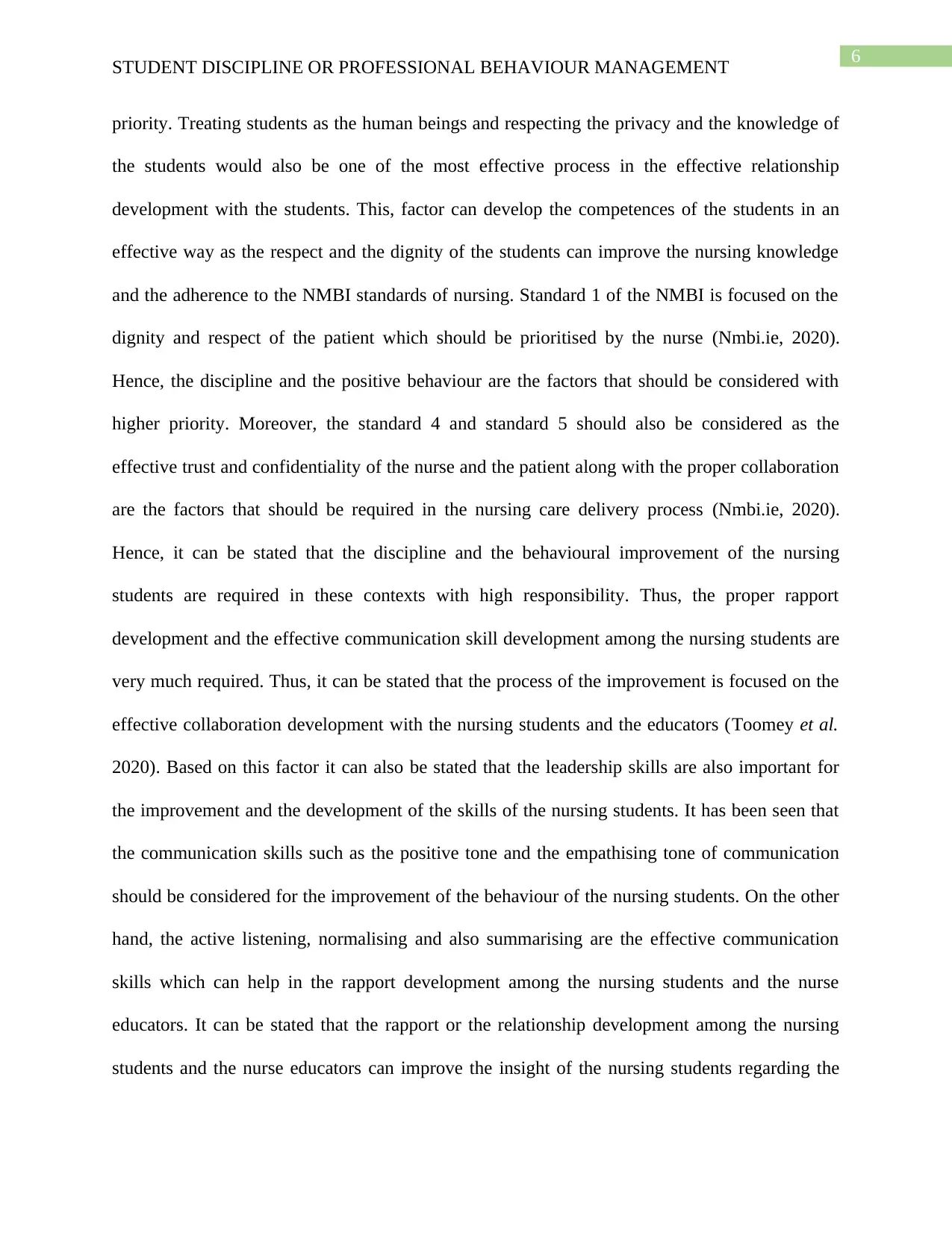
6
STUDENT DISCIPLINE OR PROFESSIONAL BEHAVIOUR MANAGEMENT
priority. Treating students as the human beings and respecting the privacy and the knowledge of
the students would also be one of the most effective process in the effective relationship
development with the students. This, factor can develop the competences of the students in an
effective way as the respect and the dignity of the students can improve the nursing knowledge
and the adherence to the NMBI standards of nursing. Standard 1 of the NMBI is focused on the
dignity and respect of the patient which should be prioritised by the nurse (Nmbi.ie, 2020).
Hence, the discipline and the positive behaviour are the factors that should be considered with
higher priority. Moreover, the standard 4 and standard 5 should also be considered as the
effective trust and confidentiality of the nurse and the patient along with the proper collaboration
are the factors that should be required in the nursing care delivery process (Nmbi.ie, 2020).
Hence, it can be stated that the discipline and the behavioural improvement of the nursing
students are required in these contexts with high responsibility. Thus, the proper rapport
development and the effective communication skill development among the nursing students are
very much required. Thus, it can be stated that the process of the improvement is focused on the
effective collaboration development with the nursing students and the educators (Toomey et al.
2020). Based on this factor it can also be stated that the leadership skills are also important for
the improvement and the development of the skills of the nursing students. It has been seen that
the communication skills such as the positive tone and the empathising tone of communication
should be considered for the improvement of the behaviour of the nursing students. On the other
hand, the active listening, normalising and also summarising are the effective communication
skills which can help in the rapport development among the nursing students and the nurse
educators. It can be stated that the rapport or the relationship development among the nursing
students and the nurse educators can improve the insight of the nursing students regarding the
STUDENT DISCIPLINE OR PROFESSIONAL BEHAVIOUR MANAGEMENT
priority. Treating students as the human beings and respecting the privacy and the knowledge of
the students would also be one of the most effective process in the effective relationship
development with the students. This, factor can develop the competences of the students in an
effective way as the respect and the dignity of the students can improve the nursing knowledge
and the adherence to the NMBI standards of nursing. Standard 1 of the NMBI is focused on the
dignity and respect of the patient which should be prioritised by the nurse (Nmbi.ie, 2020).
Hence, the discipline and the positive behaviour are the factors that should be considered with
higher priority. Moreover, the standard 4 and standard 5 should also be considered as the
effective trust and confidentiality of the nurse and the patient along with the proper collaboration
are the factors that should be required in the nursing care delivery process (Nmbi.ie, 2020).
Hence, it can be stated that the discipline and the behavioural improvement of the nursing
students are required in these contexts with high responsibility. Thus, the proper rapport
development and the effective communication skill development among the nursing students are
very much required. Thus, it can be stated that the process of the improvement is focused on the
effective collaboration development with the nursing students and the educators (Toomey et al.
2020). Based on this factor it can also be stated that the leadership skills are also important for
the improvement and the development of the skills of the nursing students. It has been seen that
the communication skills such as the positive tone and the empathising tone of communication
should be considered for the improvement of the behaviour of the nursing students. On the other
hand, the active listening, normalising and also summarising are the effective communication
skills which can help in the rapport development among the nursing students and the nurse
educators. It can be stated that the rapport or the relationship development among the nursing
students and the nurse educators can improve the insight of the nursing students regarding the
Paraphrase This Document
Need a fresh take? Get an instant paraphrase of this document with our AI Paraphraser
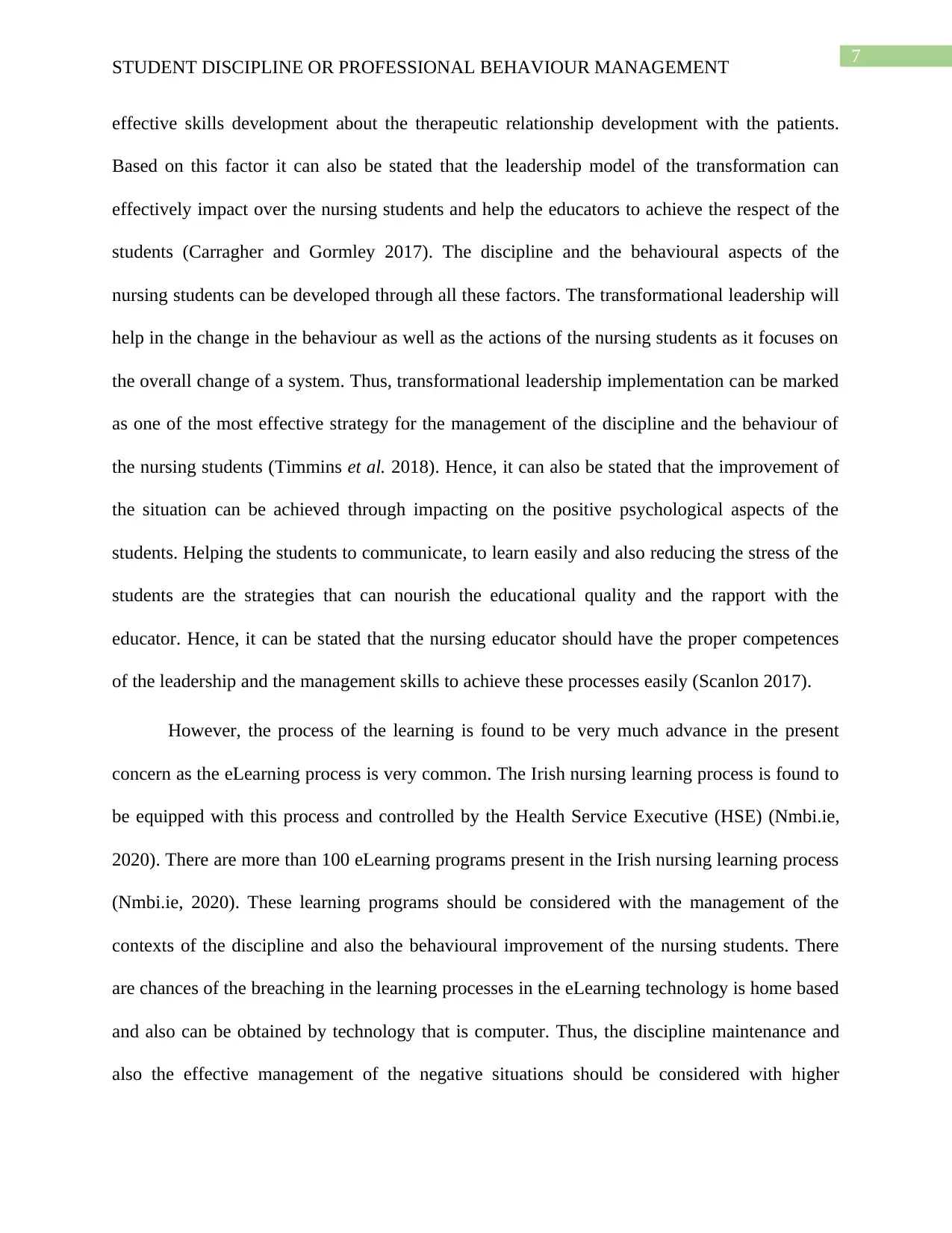
7
STUDENT DISCIPLINE OR PROFESSIONAL BEHAVIOUR MANAGEMENT
effective skills development about the therapeutic relationship development with the patients.
Based on this factor it can also be stated that the leadership model of the transformation can
effectively impact over the nursing students and help the educators to achieve the respect of the
students (Carragher and Gormley 2017). The discipline and the behavioural aspects of the
nursing students can be developed through all these factors. The transformational leadership will
help in the change in the behaviour as well as the actions of the nursing students as it focuses on
the overall change of a system. Thus, transformational leadership implementation can be marked
as one of the most effective strategy for the management of the discipline and the behaviour of
the nursing students (Timmins et al. 2018). Hence, it can also be stated that the improvement of
the situation can be achieved through impacting on the positive psychological aspects of the
students. Helping the students to communicate, to learn easily and also reducing the stress of the
students are the strategies that can nourish the educational quality and the rapport with the
educator. Hence, it can be stated that the nursing educator should have the proper competences
of the leadership and the management skills to achieve these processes easily (Scanlon 2017).
However, the process of the learning is found to be very much advance in the present
concern as the eLearning process is very common. The Irish nursing learning process is found to
be equipped with this process and controlled by the Health Service Executive (HSE) (Nmbi.ie,
2020). There are more than 100 eLearning programs present in the Irish nursing learning process
(Nmbi.ie, 2020). These learning programs should be considered with the management of the
contexts of the discipline and also the behavioural improvement of the nursing students. There
are chances of the breaching in the learning processes in the eLearning technology is home based
and also can be obtained by technology that is computer. Thus, the discipline maintenance and
also the effective management of the negative situations should be considered with higher
STUDENT DISCIPLINE OR PROFESSIONAL BEHAVIOUR MANAGEMENT
effective skills development about the therapeutic relationship development with the patients.
Based on this factor it can also be stated that the leadership model of the transformation can
effectively impact over the nursing students and help the educators to achieve the respect of the
students (Carragher and Gormley 2017). The discipline and the behavioural aspects of the
nursing students can be developed through all these factors. The transformational leadership will
help in the change in the behaviour as well as the actions of the nursing students as it focuses on
the overall change of a system. Thus, transformational leadership implementation can be marked
as one of the most effective strategy for the management of the discipline and the behaviour of
the nursing students (Timmins et al. 2018). Hence, it can also be stated that the improvement of
the situation can be achieved through impacting on the positive psychological aspects of the
students. Helping the students to communicate, to learn easily and also reducing the stress of the
students are the strategies that can nourish the educational quality and the rapport with the
educator. Hence, it can be stated that the nursing educator should have the proper competences
of the leadership and the management skills to achieve these processes easily (Scanlon 2017).
However, the process of the learning is found to be very much advance in the present
concern as the eLearning process is very common. The Irish nursing learning process is found to
be equipped with this process and controlled by the Health Service Executive (HSE) (Nmbi.ie,
2020). There are more than 100 eLearning programs present in the Irish nursing learning process
(Nmbi.ie, 2020). These learning programs should be considered with the management of the
contexts of the discipline and also the behavioural improvement of the nursing students. There
are chances of the breaching in the learning processes in the eLearning technology is home based
and also can be obtained by technology that is computer. Thus, the discipline maintenance and
also the effective management of the negative situations should be considered with higher
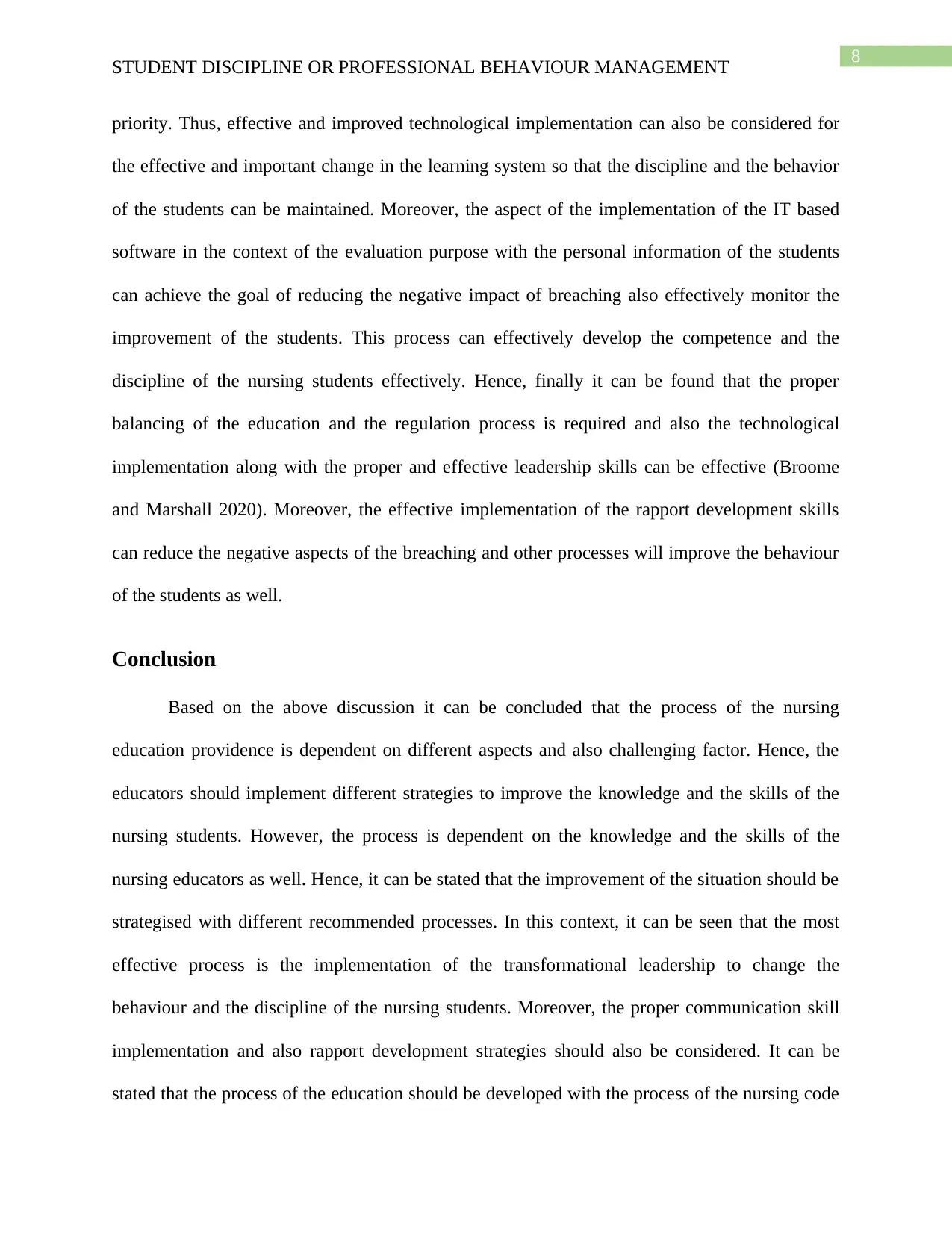
8
STUDENT DISCIPLINE OR PROFESSIONAL BEHAVIOUR MANAGEMENT
priority. Thus, effective and improved technological implementation can also be considered for
the effective and important change in the learning system so that the discipline and the behavior
of the students can be maintained. Moreover, the aspect of the implementation of the IT based
software in the context of the evaluation purpose with the personal information of the students
can achieve the goal of reducing the negative impact of breaching also effectively monitor the
improvement of the students. This process can effectively develop the competence and the
discipline of the nursing students effectively. Hence, finally it can be found that the proper
balancing of the education and the regulation process is required and also the technological
implementation along with the proper and effective leadership skills can be effective (Broome
and Marshall 2020). Moreover, the effective implementation of the rapport development skills
can reduce the negative aspects of the breaching and other processes will improve the behaviour
of the students as well.
Conclusion
Based on the above discussion it can be concluded that the process of the nursing
education providence is dependent on different aspects and also challenging factor. Hence, the
educators should implement different strategies to improve the knowledge and the skills of the
nursing students. However, the process is dependent on the knowledge and the skills of the
nursing educators as well. Hence, it can be stated that the improvement of the situation should be
strategised with different recommended processes. In this context, it can be seen that the most
effective process is the implementation of the transformational leadership to change the
behaviour and the discipline of the nursing students. Moreover, the proper communication skill
implementation and also rapport development strategies should also be considered. It can be
stated that the process of the education should be developed with the process of the nursing code
STUDENT DISCIPLINE OR PROFESSIONAL BEHAVIOUR MANAGEMENT
priority. Thus, effective and improved technological implementation can also be considered for
the effective and important change in the learning system so that the discipline and the behavior
of the students can be maintained. Moreover, the aspect of the implementation of the IT based
software in the context of the evaluation purpose with the personal information of the students
can achieve the goal of reducing the negative impact of breaching also effectively monitor the
improvement of the students. This process can effectively develop the competence and the
discipline of the nursing students effectively. Hence, finally it can be found that the proper
balancing of the education and the regulation process is required and also the technological
implementation along with the proper and effective leadership skills can be effective (Broome
and Marshall 2020). Moreover, the effective implementation of the rapport development skills
can reduce the negative aspects of the breaching and other processes will improve the behaviour
of the students as well.
Conclusion
Based on the above discussion it can be concluded that the process of the nursing
education providence is dependent on different aspects and also challenging factor. Hence, the
educators should implement different strategies to improve the knowledge and the skills of the
nursing students. However, the process is dependent on the knowledge and the skills of the
nursing educators as well. Hence, it can be stated that the improvement of the situation should be
strategised with different recommended processes. In this context, it can be seen that the most
effective process is the implementation of the transformational leadership to change the
behaviour and the discipline of the nursing students. Moreover, the proper communication skill
implementation and also rapport development strategies should also be considered. It can be
stated that the process of the education should be developed with the process of the nursing code
⊘ This is a preview!⊘
Do you want full access?
Subscribe today to unlock all pages.

Trusted by 1+ million students worldwide
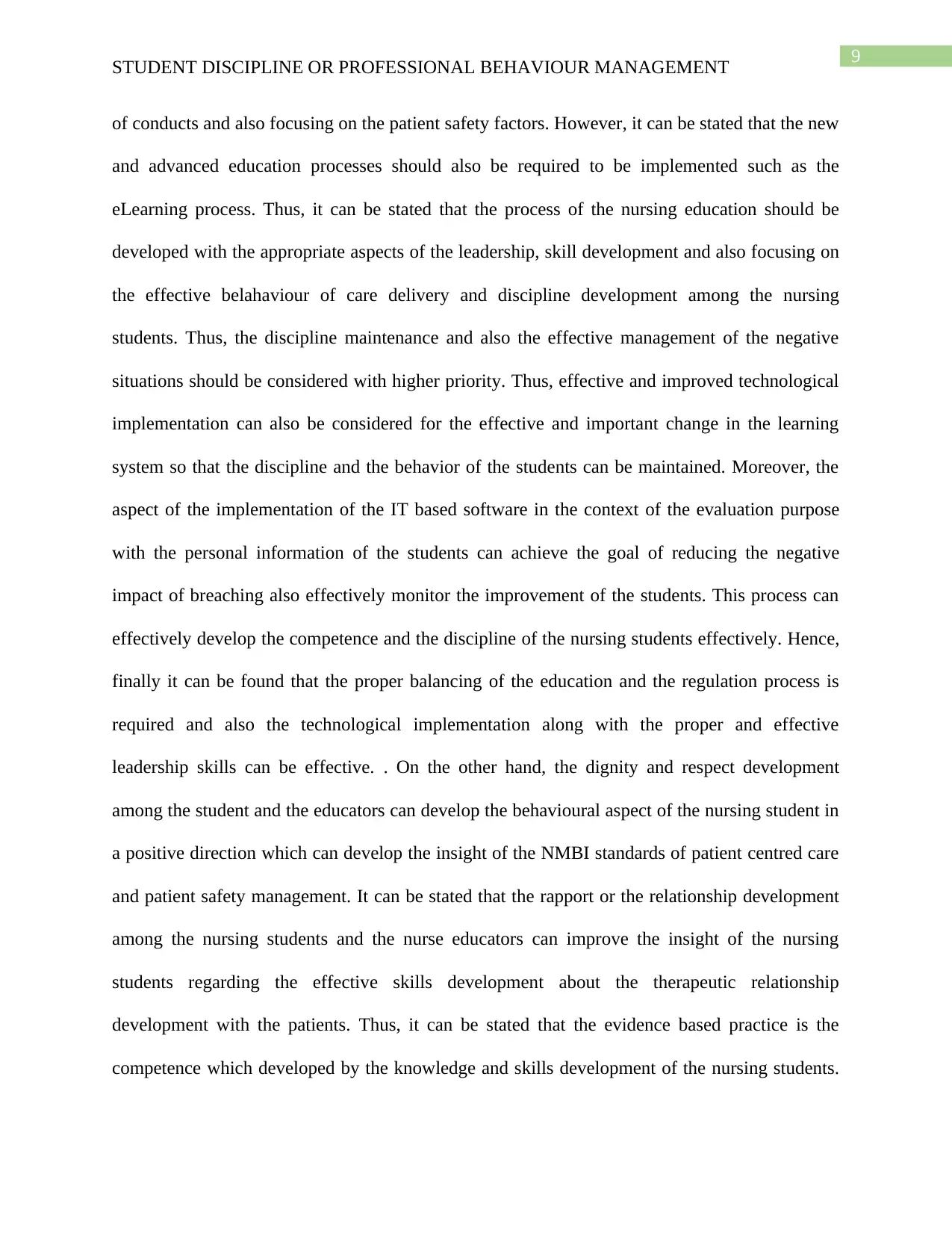
9
STUDENT DISCIPLINE OR PROFESSIONAL BEHAVIOUR MANAGEMENT
of conducts and also focusing on the patient safety factors. However, it can be stated that the new
and advanced education processes should also be required to be implemented such as the
eLearning process. Thus, it can be stated that the process of the nursing education should be
developed with the appropriate aspects of the leadership, skill development and also focusing on
the effective belahaviour of care delivery and discipline development among the nursing
students. Thus, the discipline maintenance and also the effective management of the negative
situations should be considered with higher priority. Thus, effective and improved technological
implementation can also be considered for the effective and important change in the learning
system so that the discipline and the behavior of the students can be maintained. Moreover, the
aspect of the implementation of the IT based software in the context of the evaluation purpose
with the personal information of the students can achieve the goal of reducing the negative
impact of breaching also effectively monitor the improvement of the students. This process can
effectively develop the competence and the discipline of the nursing students effectively. Hence,
finally it can be found that the proper balancing of the education and the regulation process is
required and also the technological implementation along with the proper and effective
leadership skills can be effective. . On the other hand, the dignity and respect development
among the student and the educators can develop the behavioural aspect of the nursing student in
a positive direction which can develop the insight of the NMBI standards of patient centred care
and patient safety management. It can be stated that the rapport or the relationship development
among the nursing students and the nurse educators can improve the insight of the nursing
students regarding the effective skills development about the therapeutic relationship
development with the patients. Thus, it can be stated that the evidence based practice is the
competence which developed by the knowledge and skills development of the nursing students.
STUDENT DISCIPLINE OR PROFESSIONAL BEHAVIOUR MANAGEMENT
of conducts and also focusing on the patient safety factors. However, it can be stated that the new
and advanced education processes should also be required to be implemented such as the
eLearning process. Thus, it can be stated that the process of the nursing education should be
developed with the appropriate aspects of the leadership, skill development and also focusing on
the effective belahaviour of care delivery and discipline development among the nursing
students. Thus, the discipline maintenance and also the effective management of the negative
situations should be considered with higher priority. Thus, effective and improved technological
implementation can also be considered for the effective and important change in the learning
system so that the discipline and the behavior of the students can be maintained. Moreover, the
aspect of the implementation of the IT based software in the context of the evaluation purpose
with the personal information of the students can achieve the goal of reducing the negative
impact of breaching also effectively monitor the improvement of the students. This process can
effectively develop the competence and the discipline of the nursing students effectively. Hence,
finally it can be found that the proper balancing of the education and the regulation process is
required and also the technological implementation along with the proper and effective
leadership skills can be effective. . On the other hand, the dignity and respect development
among the student and the educators can develop the behavioural aspect of the nursing student in
a positive direction which can develop the insight of the NMBI standards of patient centred care
and patient safety management. It can be stated that the rapport or the relationship development
among the nursing students and the nurse educators can improve the insight of the nursing
students regarding the effective skills development about the therapeutic relationship
development with the patients. Thus, it can be stated that the evidence based practice is the
competence which developed by the knowledge and skills development of the nursing students.
Paraphrase This Document
Need a fresh take? Get an instant paraphrase of this document with our AI Paraphraser
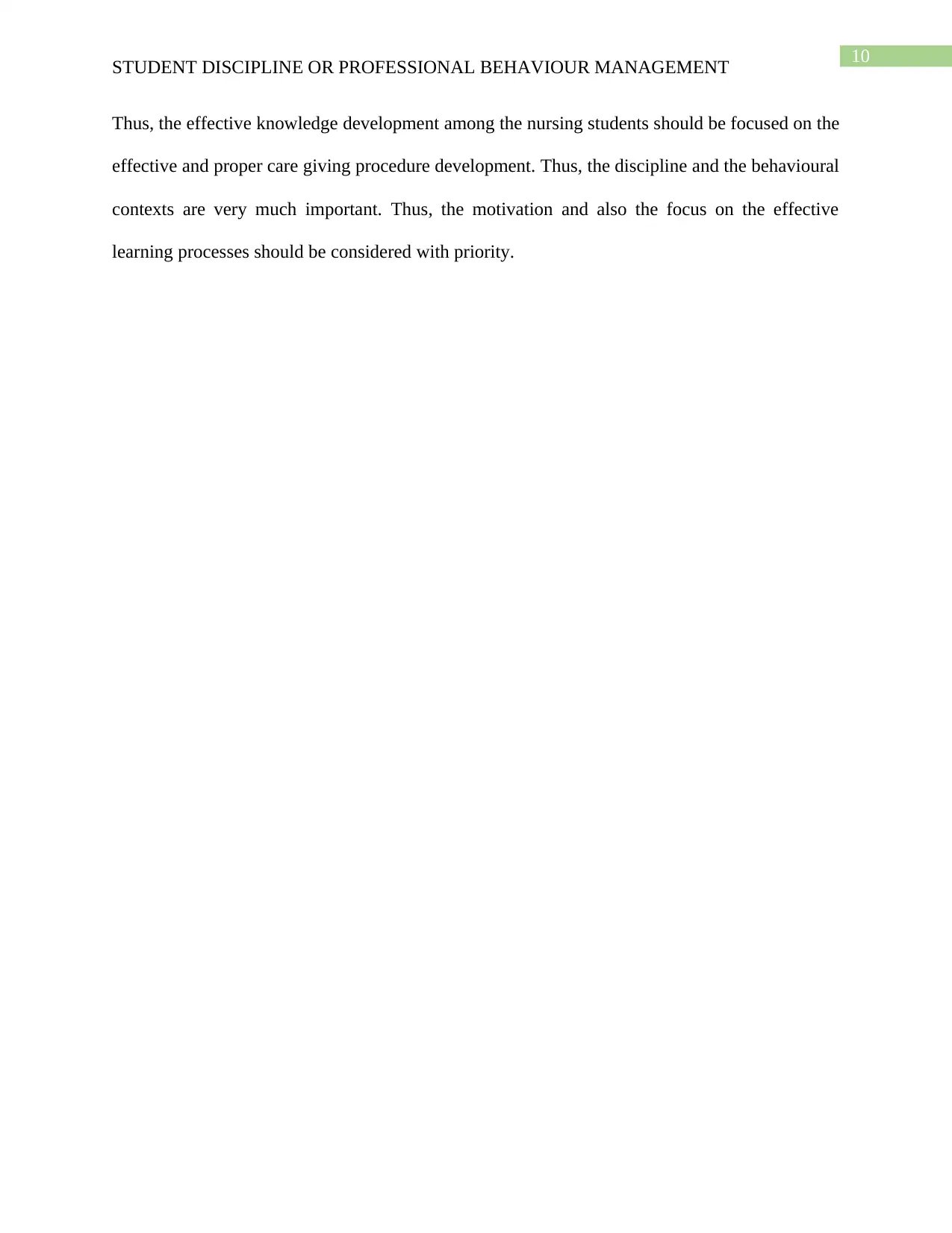
10
STUDENT DISCIPLINE OR PROFESSIONAL BEHAVIOUR MANAGEMENT
Thus, the effective knowledge development among the nursing students should be focused on the
effective and proper care giving procedure development. Thus, the discipline and the behavioural
contexts are very much important. Thus, the motivation and also the focus on the effective
learning processes should be considered with priority.
STUDENT DISCIPLINE OR PROFESSIONAL BEHAVIOUR MANAGEMENT
Thus, the effective knowledge development among the nursing students should be focused on the
effective and proper care giving procedure development. Thus, the discipline and the behavioural
contexts are very much important. Thus, the motivation and also the focus on the effective
learning processes should be considered with priority.
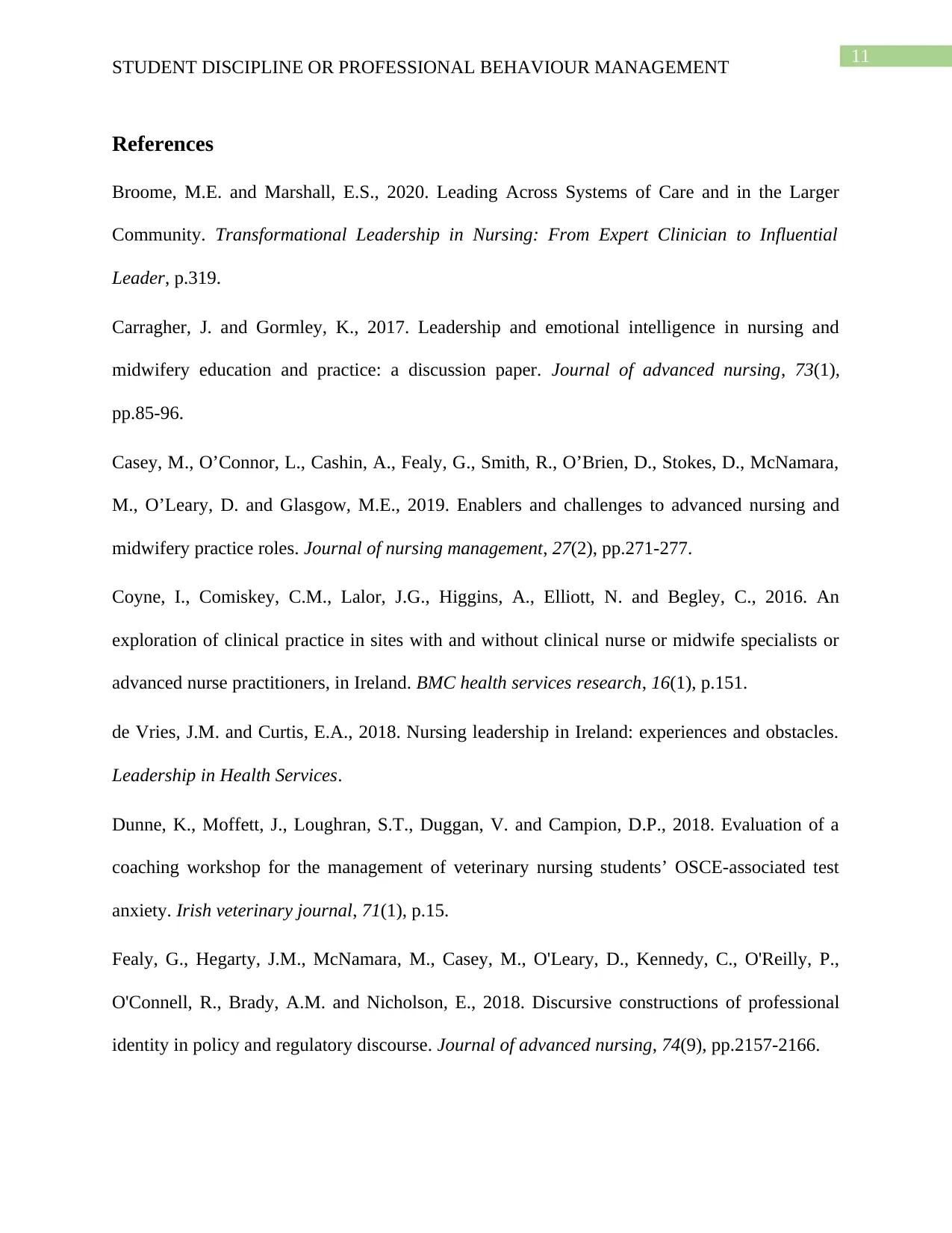
11
STUDENT DISCIPLINE OR PROFESSIONAL BEHAVIOUR MANAGEMENT
References
Broome, M.E. and Marshall, E.S., 2020. Leading Across Systems of Care and in the Larger
Community. Transformational Leadership in Nursing: From Expert Clinician to Influential
Leader, p.319.
Carragher, J. and Gormley, K., 2017. Leadership and emotional intelligence in nursing and
midwifery education and practice: a discussion paper. Journal of advanced nursing, 73(1),
pp.85-96.
Casey, M., O’Connor, L., Cashin, A., Fealy, G., Smith, R., O’Brien, D., Stokes, D., McNamara,
M., O’Leary, D. and Glasgow, M.E., 2019. Enablers and challenges to advanced nursing and
midwifery practice roles. Journal of nursing management, 27(2), pp.271-277.
Coyne, I., Comiskey, C.M., Lalor, J.G., Higgins, A., Elliott, N. and Begley, C., 2016. An
exploration of clinical practice in sites with and without clinical nurse or midwife specialists or
advanced nurse practitioners, in Ireland. BMC health services research, 16(1), p.151.
de Vries, J.M. and Curtis, E.A., 2018. Nursing leadership in Ireland: experiences and obstacles.
Leadership in Health Services.
Dunne, K., Moffett, J., Loughran, S.T., Duggan, V. and Campion, D.P., 2018. Evaluation of a
coaching workshop for the management of veterinary nursing students’ OSCE-associated test
anxiety. Irish veterinary journal, 71(1), p.15.
Fealy, G., Hegarty, J.M., McNamara, M., Casey, M., O'Leary, D., Kennedy, C., O'Reilly, P.,
O'Connell, R., Brady, A.M. and Nicholson, E., 2018. Discursive constructions of professional
identity in policy and regulatory discourse. Journal of advanced nursing, 74(9), pp.2157-2166.
STUDENT DISCIPLINE OR PROFESSIONAL BEHAVIOUR MANAGEMENT
References
Broome, M.E. and Marshall, E.S., 2020. Leading Across Systems of Care and in the Larger
Community. Transformational Leadership in Nursing: From Expert Clinician to Influential
Leader, p.319.
Carragher, J. and Gormley, K., 2017. Leadership and emotional intelligence in nursing and
midwifery education and practice: a discussion paper. Journal of advanced nursing, 73(1),
pp.85-96.
Casey, M., O’Connor, L., Cashin, A., Fealy, G., Smith, R., O’Brien, D., Stokes, D., McNamara,
M., O’Leary, D. and Glasgow, M.E., 2019. Enablers and challenges to advanced nursing and
midwifery practice roles. Journal of nursing management, 27(2), pp.271-277.
Coyne, I., Comiskey, C.M., Lalor, J.G., Higgins, A., Elliott, N. and Begley, C., 2016. An
exploration of clinical practice in sites with and without clinical nurse or midwife specialists or
advanced nurse practitioners, in Ireland. BMC health services research, 16(1), p.151.
de Vries, J.M. and Curtis, E.A., 2018. Nursing leadership in Ireland: experiences and obstacles.
Leadership in Health Services.
Dunne, K., Moffett, J., Loughran, S.T., Duggan, V. and Campion, D.P., 2018. Evaluation of a
coaching workshop for the management of veterinary nursing students’ OSCE-associated test
anxiety. Irish veterinary journal, 71(1), p.15.
Fealy, G., Hegarty, J.M., McNamara, M., Casey, M., O'Leary, D., Kennedy, C., O'Reilly, P.,
O'Connell, R., Brady, A.M. and Nicholson, E., 2018. Discursive constructions of professional
identity in policy and regulatory discourse. Journal of advanced nursing, 74(9), pp.2157-2166.
⊘ This is a preview!⊘
Do you want full access?
Subscribe today to unlock all pages.

Trusted by 1+ million students worldwide
1 out of 15
Related Documents
Your All-in-One AI-Powered Toolkit for Academic Success.
+13062052269
info@desklib.com
Available 24*7 on WhatsApp / Email
![[object Object]](/_next/static/media/star-bottom.7253800d.svg)
Unlock your academic potential
Copyright © 2020–2026 A2Z Services. All Rights Reserved. Developed and managed by ZUCOL.





